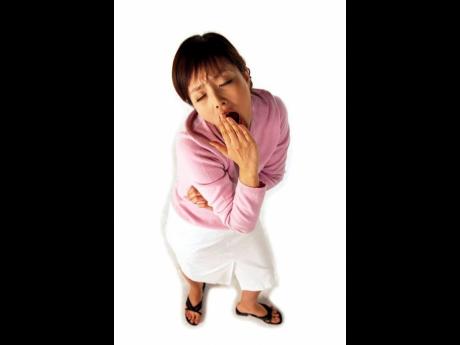Check Up: Why can’t she sleep?
Dear Readers,
Marie is a 40-year-old who finds that the daily pressures and activities at work regularly leave her with a ‘buzz’ in the evenings.
She thinks this is why she’s been finding it so difficult to fall asleep at nights. She asks Check Up if there are any foods or fruits she can take to help her relax and sleep.
She has taken sleeping tablets in the past but they leave her with a ‘hungover’ feeling the next day and she’s heard that some of them might be addictive.
There are several life changes which can be made to help facilitate nightly sleep. It’s called practising good ‘sleep hygiene’ and involves:
An adequate period after work to ‘wind down’, involving quiet times
Listening to restful musical interludes or reading
Practising yoga, but not too near bed time as exercise can act as a stimulant
Avoiding ingesting stimulants like coffee and caffeine-containing beverages and drinks after 3 p.m.
Not eating too late
Avoiding alcohol near bedtime
Establishing a routine night time “winding down” set of activities which the body grows to know and respond to
Don’t leave the TV on at bed time
Going to bed at approximately the same time every night including holidays and weekends except for special occasions
When sleep hygiene has been put in place, you can then look to additional measures to help facilitate sleep. Ingesting certain dietary foods regularly can help promote sleep.
There are four main vitamins and minerals found in foods that will help to promote sleep. These are:
n Tryptophan
n Magnesium
n Calcium
n Vitamin B6
Some of these substances help the body to produce melatonin which is the hormone that is responsible for regulating the rhythm of wakefulness and sleep in our bodies.
Melatonin levels increase in our blood near bedtime to help us fall asleep, and decreases to allow wakefulness around the time to get up and be alert.
Eating certain foods which contain the useful substances, at the appropriate time, can help enable sleep.
Tryptophan is best obtained from foods like:
n Dairy products
n Poultry, especially turkey
n Nuts and seeds
n Legumes
n Vegetables, mainly the
green leafy ones
n Fruits
n Grains
Magnesium is a natural relaxant in sleep and a deficiency of it can result in insomnia. Magnesium is present substantially in:
n Dark green leafy vegetables
n Fish
n Soybeans
n Bananas
n Avocado
n Yoghurt
Calcium helps the brain produce melatonin. Calcium can be obtained from:
n Milk and milk products
n Sardines
n Fortified cereals
n Fortified orange juice
n Okra
Vitamin B6 helps convert tryptophan to melatonin. A lack of vitamin B6 is also associated with depression and mood disorders which can also be a cause of insomnia. Vitamin B6 is available from:
n Sunflower seeds, flaxseed
and pistachio nuts
n Fish
n All meat
n Dried prunes
n Spinach
Please avoid the following foods and drinks if you suffer from insomnia:
n All foods and drinks containing caffeine.
n Spicy foods which can cause heart burn and acid reflux
n Alcohol
n Fatty foods
n High protein foods such as meat eaten near bed time
n Foods and fruits that contain plenty of water and will cause you to get up to urinate during the night if eaten near bed time
If this doesn’t help, she should see her doctor as there are certain hormonal disorders associated with insomnia.
Also, if she suffers with food allergies or takes several medications regularly, it’s best to check her doctor first before changing your diet.
Write Check Up: PO Box 1731: KGN 8: Email arnaj56@gmail.com AJM






































